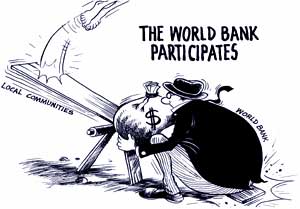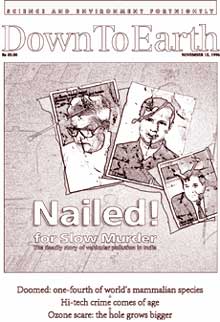 "What gets my gall the most is that the subject of poverty and
environment is not even on anyone’s agenda. Again, who is to blame? Guess for
yourself. Issues in which the economic interests of industrialised countries
coincide with their ecological interests are acceptable in the UN; the rest is usually a
sham. But who is to blame? Democratically elected leaders of Western democracies? It is
the governments and diplomats of developing countries who should be squarely blamed —
like the pompous ambassadors of our Foreign ministry, who never come forward with their
own agenda for global environmental negotiations. Third World environment ministry
officials are even worse, because they see lucrative job opportunities for themselves in
these new global environmental agencies; and slowly but steadily, they cave in to
everything." "What gets my gall the most is that the subject of poverty and
environment is not even on anyone’s agenda. Again, who is to blame? Guess for
yourself. Issues in which the economic interests of industrialised countries
coincide with their ecological interests are acceptable in the UN; the rest is usually a
sham. But who is to blame? Democratically elected leaders of Western democracies? It is
the governments and diplomats of developing countries who should be squarely blamed —
like the pompous ambassadors of our Foreign ministry, who never come forward with their
own agenda for global environmental negotiations. Third World environment ministry
officials are even worse, because they see lucrative job opportunities for themselves in
these new global environmental agencies; and slowly but steadily, they cave in to
everything."Editor’s
page, Down To Earth, July 31, 1996
  
"Will the US government care much if
an Indian, Bangladeshi or a Maldivean were to drown because of rising sea levels?"
But if there existed a framework of global democracy, a Bangladeshi would have the right
to stop US citizens enjoying Mother Earth to a point that would threaten the very
existence of his or her country. All environmental talk of only one Earth remains deeply
hollow until such a democratic right is recognised and made legally enforceable."
Editor’s page, Down To Earth,
October 15, 1996
  
"Participation is a lovely word. For long it
has been twisted around to mean anything according to the whims and fancies of the user of
the word. The GEF ecodevelopment project could have provided the much needed
space for institutional innovations that are desperately needed for people’s
participation. But the project leaves all management decisions to bureaucracy, while
people’s participation is left more or less in the same mould as ‘I speak, you
listen’."
Editor’s page, Down To Earth,
October 31, 1996
  
"Among a host of environmental misdemeanours
— crimes, really — the dramatic rise in air pollution in most Indian
metropolises over the last one decade is a direct result of an inefficient state, both on
terms of balancing responsibilities and precautionary actions. It is nothing short of a
slow murder! Even as an environmentalist, I was not aware of all the contours of
this highly technical problem of vehicular pollution. But this tailpipery struck me as a
little imbecilic; as if only vehicle maintenance was at the heart of the problem.
It has become clear to me that tailpipe checking is
clearcut harassment of the citizen by the state in the name of environment. What is also
clear is that vehicular pollution is a created problem, not a ‘natural’
one."
Down To Earth, November 15, 1996
  
 "The ‘resource illiteracy’ of bureaucrats and lndustry
is dangerous for this country’s poor. Both government and private sector
leaders cry themselves hoarse about India’s high population growth rate, but neither
appreciates the implications for their activities of a high population density. In an
ecological context, high population density simply means that almost all the ecological
niches, such as deserts, rivers, lakes and humid hill slopes, are occupied by a human
group for their sustenance. �Hence, if the resource base of a particular area is
closed in the name of conservation or taken over by a politically powerful entity in the
name of development, it would lead to displacement, social injustice, resentment and
protests." "The ‘resource illiteracy’ of bureaucrats and lndustry
is dangerous for this country’s poor. Both government and private sector
leaders cry themselves hoarse about India’s high population growth rate, but neither
appreciates the implications for their activities of a high population density. In an
ecological context, high population density simply means that almost all the ecological
niches, such as deserts, rivers, lakes and humid hill slopes, are occupied by a human
group for their sustenance. �Hence, if the resource base of a particular area is
closed in the name of conservation or taken over by a politically powerful entity in the
name of development, it would lead to displacement, social injustice, resentment and
protests."
Down To Earth, November 30, 1996
  
"Cancer is a frightening word. As
an environmental activist and writer, I have tried for years to promote nationwide concern
about the deteriorating state of our environment. The idea of writing my own travails as
an environmental victim had, however, never crossed my mind. But obviously, �I could
not have escaped what was and is happening all around me. My cancer, like most cancers, is
related to environmental pollution. In India, cancer is still largely regarded as a
relatively insignificant threat to public health."
Down To Earth, November 30, 1996
  
|